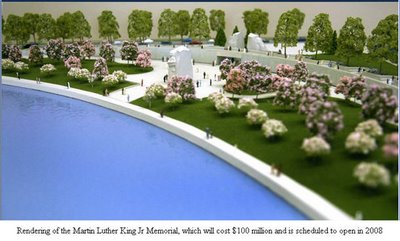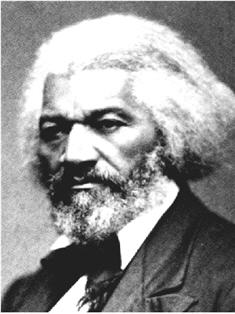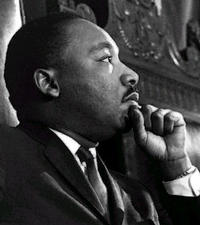 Although dark clouds made the occasion seem more funereal than joyful, President George W. Bush headlined a Who’s Who from the Civil Rights Movement on the Washington Mall yesterday for the groundbreaking of the Martin Luther King Jr. (MLK) Memorial.
Although dark clouds made the occasion seem more funereal than joyful, President George W. Bush headlined a Who’s Who from the Civil Rights Movement on the Washington Mall yesterday for the groundbreaking of the Martin Luther King Jr. (MLK) Memorial.But the overcast skies did not dampen anyone’s spirits. Because, being so acutely aware that MLK’s legacy represents the heroic struggle and triumph of black Americans, we were simply overjoyed by the historic significance of this occasion.
Indeed, as I tuned out the racial and political platitudes being recited by dignitaries like former President Bill Clinton and Oprah Winfrey, I became awestruck by the juxtaposition of the civil strife that attended the desegregation of schools and places of public accommodation 50 years ago, with the civil harmony that attended the desegregation of this most coveted place of honor in America yesterday.
 Yet I suspect my friends who have seen the place of honor MLK occupies in my home will be surprised to learn that I am actually conflicted about this dedication. Because as much as I admire MLK, I believe the life, political activism, and legacy of Frederick Douglass (1818-1895) make him more worthy of being the first black to be memorialised in this American Pantheon – alongside George Washington, Thomas Jefferson, and Abraham Lincoln.
Yet I suspect my friends who have seen the place of honor MLK occupies in my home will be surprised to learn that I am actually conflicted about this dedication. Because as much as I admire MLK, I believe the life, political activism, and legacy of Frederick Douglass (1818-1895) make him more worthy of being the first black to be memorialised in this American Pantheon – alongside George Washington, Thomas Jefferson, and Abraham Lincoln.
Here’s why:
- Douglass was born in slavery; MLK was born in freedom.
- Douglass spent his formative years on a plantation scrapping with his master’s dogs for food to eat; MLK spent his in relative luxury dining with America’s black elite.
- Douglass taught himself to read and write; MLK attended America’s best schools, including Morehouse College and Boston University.
- Douglass escaped from slavery, settled in the North, and began his political activism by leading challenges to segregation laws, which were as strictly enforced in the Antebellum North as they were in the Deep South; MLK graduated from university, settled in the South, and began his political activism by accepting calls to lead Blacks – who had already begun the now-seminal Montgomery Bus Boycott.
- Douglass had no peer among blacks in the fight to end slavery; MLK had Stokely Carmichael and Malcolm X – whose message of self-defense and black nationalism resonated more with young blacks (for whom ‘by any means necessary’ was far more liberating and empowering than ‘I have a dream’).
- Douglass left no trail of marital infidelities in his wake that could compromise judgement of the content of his character; MLK did, so much so that, in my resigned attempt to defend his character, I was constrained to title my commentary “Martin Luther King Jr Was Also a Womanizer, So What?”, January 4, 2006.
- Douglass lived long enough (to age 77) not only to see his dream of abolition fulfilled, but also to become a professional man (as a U.S. Marshall and recorder of deeds), an international statesman (as U.S. Ambassador to Santo Domingo and Haiti), and a political champion for yet another cause (women’s suffrage); MLK died too soon (at age 39) not only to see his dream of racial equality fulfilled, but also to pursue any ambition beyond the struggle for civil rights.
- Douglass’s published works on the fight for freedom from slavery are voluminous; MLK’s on the struggle for civil rights are modest by comparison. (I refer you to articles from one of Douglass’s many newspapers, North Star, as well as his autobiographies Narrative of the Life of Frederick Douglass – an American Slave, My Bondage and My Freedom, and Life and Times of Frederick Douglass. It might also interest you to know that eyewitness accounts – by the likes of famous abolitionist William Lloyd Garrison – suggest that Douglass was every bit the orator MLK was. Indeed, it’s arguable that his “What to the slave is the 4th of July?” speech, which he delivered on July 5, 1852, was even more provocative and inspiring than MLK’s ‘I Have A Dream’ speech, which he delivered on August 28, 1963.
 Clearly this is not the forum for an exhaustive comparative analysis of the legacies of these two great black Americans. But I trust this rudimentary sketch suffices to show why I think Douglass – who fought for blacks to be free from slavery, is more worthy of being the first one memorialised on the Mall than MLK – who preached for them to be free to go to school and socialize with whites.
Clearly this is not the forum for an exhaustive comparative analysis of the legacies of these two great black Americans. But I trust this rudimentary sketch suffices to show why I think Douglass – who fought for blacks to be free from slavery, is more worthy of being the first one memorialised on the Mall than MLK – who preached for them to be free to go to school and socialize with whites.
NOTE: King’s legacy has not been enhanced by the squabbling amongst his four children – pitting two of them who regard it as their inheritance to use for their personal benefit against the other two who regard it as a public trust for them to manage as zealous trustees.
In fact, here’s how Martin Luther King III who – along with his sister Bernice – argued against the sale of MLK’s papers, writings, and recorded speeches:
Tearing the center’s unique and essential elements apart — its physical memorial and its living legacy — only diminishes them both, thereby weakening, not strengthening, the cause to which my father and mother gave so much.
Unfortunately, he was overruled by Dexter King, Chairman of the King Center in Atlanta where these national treasures were archived, who – along with the other sister Yolanda – betrayed their father’s legacy for a reported $30 million last June. Dexter was conspicuously absent from yesterday’s dedication.
Of course, if Dexter had one scintilla of appreciation for MLK’s familiar Biblical allusions, he would have settled for $29 million just to avoid fated comparisons to Judas who betrayed Jesus Christ for 30 pieces of silver….
Related Articles:
Martin Luther King Jr was also a womanizer….So what!
Coretta Scott King is dead!
Biography of Frederick Douglass
MLK Memorial
Leave a Reply
You must be logged in to post a comment.